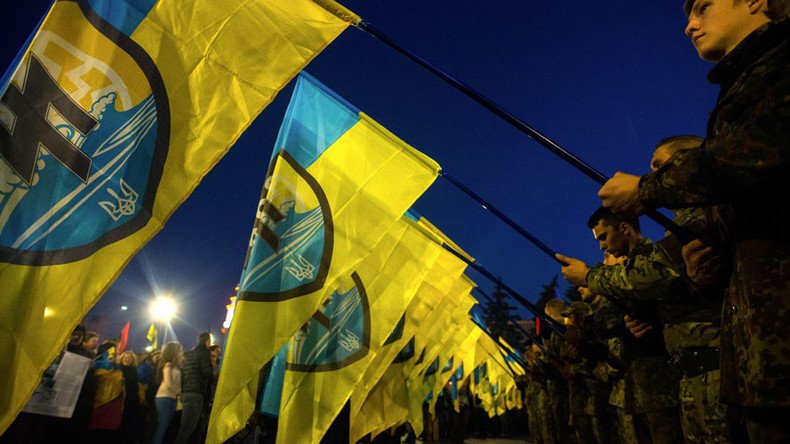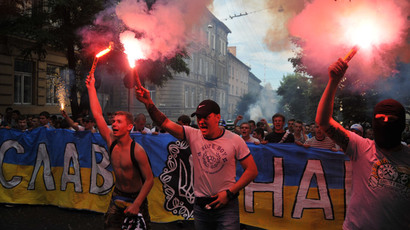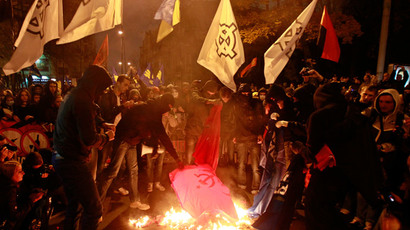Poland recognizes WWII mass killings by Ukrainian nationalists as genocide

The lower house of Polish parliament, the Sejm, has passed a resolution which labels as genocide crimes committed by Ukrainian nationalists against the Poles in during World War II. The decision was met with regret in Ukraine.
The document, adopted by the lower house of parliament on Friday, declared July 11 “the Day of commemoration of the Poles who fell victim to the genocide committed by OUN-UPA (Organization of Ukrainian Nationalists – Ukrainian Insurgent Army) and pays homage to the victims of the genocide committed by Ukrainian nationalists against citizens of the Second Polish Republic in 1943-1945."
The move follows a resolution adopted by the upper house, the Senate, on July 8, meaning that the crimes of Ukrainian nationalists in Volhynia (also called Volyn) – an area of southeast Poland that was occupied by Nazi German troops during the war – are officially viewed as genocide by the Polish state.
The “genocide” committed during this period “resulted in the massacres of more than 100,000 citizens of the Second Polish Republic, mostly peasants. Their exact number is still unknown, and many of them have not been buried with dignity to date," the Sejm’s resolution said, according to TASS.
“The memory of the victims of the crimes committed by Ukrainian nationalists in the 1940s has not been duly cherished until now, and mass murders were not called genocide in accordance with historical truth," the Polish MPs stressed.
However the Sejm acknowledged that Poles were also responsible for a crackdown on the Ukrainian population during World War II.
“While recalling the atrocities of Ukrainian nationalists, one cannot turn a blind eye to reprisal actions in Ukrainian villages that too claimed the lives of civilians," the document stressed.
Ukrainian President Petro Poroshenko said in a Facebook post that he was saddened by the Polish Sejm’s resolution.
"I feel regret about the decision of the Polish Sejm. I know that many will want to use it for political speculation," Poroshenko wrote, adding that Ukraine and Poland should find mutual forgiveness.
The Ukrainian parliament’s foreign affairs committee has slammed the declaration of the National Remembrance Day in Poland for hampering the rapprochement over the two actions.
"The adoption by the Polish Sejm and Senate of anti-Ukrainian resolutions negates all the constructive political and diplomatic developments and the efforts of the two countries and peoples aimed at mutual forgiveness and reconciliation, as well as the memory of the innocent Ukrainian and Polish victims," the committee said in a statement.
The Organization of Ukrainian Nationalists (OUN) – and the Ukrainian Insurgent Army (UPA) it later created – collaborated with the Nazis during WWII against the Soviet forces in an attempt to create a Ukrainian state independent from the USSR.
In 1943, Ukrainian nationalists launched a campaign to annihilate the Polish population in the Volhynia Region. On July 11 of that year, OUN-UPA units attacked nearly 100 Polish-populated towns and villages, killing an estimated 100,000 people, including women, children and the elderly.
Despite international condemnation, OUN-UPA members are regarded as heroes and freedom fighters by the current government in Ukraine.
Polish cosmonaut, Miroslaw Hermaszewski, who was lucky to survive an UPA-OUN attack as a baby, has welcomed the parliamentary resolution.
“I’m very emotional today. I thank them [the MPs] for making such an important decision. It’s was a genocide – there’s no other word for it,” Hermaszewski told RT.
The cosmonaut, who spent over a week in space back in 1978, expressed hope that the decision wouldn’t affect relations between Poland and Ukraine, which “we value very highly.”
“We’re not talking about Ukrainians. We’re talking about Ukrainian nationalists, who fly the UPA-OUN banners. It’s the main problem. One cannot turn criminals into heroes.”
The UPA-OUN fighters attacked the village of Lipniki in Volhynia on the night of 26–27 March 1943, killing 182 people, including 18 of the cosmonaut’s relatives.
The future cosmonaut was lost by his mother, who was injured while escaping a nationalist. The baby spent hours in the snow before being found by his dad and taken to safety.














